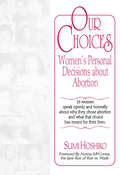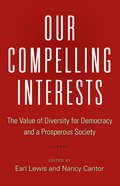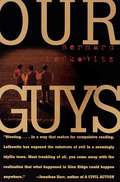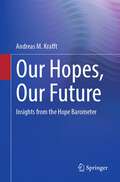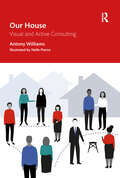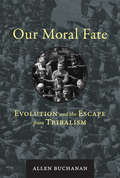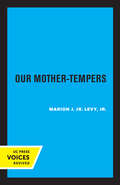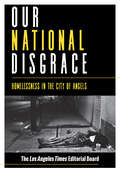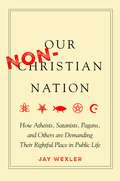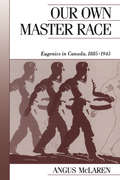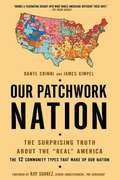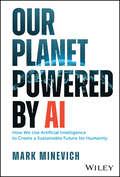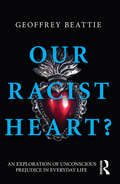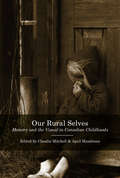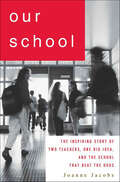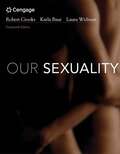- Table View
- List View
Our Choices: Women's Personal Decisions About Abortion
by Sumi HoshikoRelationships, sex, pregnancy, and abortion are among the topics discussed with engaging frankness by sixteen women in this collection of oral histories. Our Choices: Women’s Personal Decisions About Abortion presents readers with the opportunity to understand the abortion choice in a way that statistics and abstract debate cannot. The accounts show how pregnancy and abortion are inextricably tied together in the complicated social and psychological lives of men and women. By exploring the women’s feelings about becoming pregnant unintentionally and the circumstances surrounding that occurrence, the stories reveal much about how men and women communicate with each other about sex, the effect of pregnancy and abortion on relationships, and how a woman’s upbringing has shaped her knowledge and attitudes regarding sex and abortion.Our Choices: Women’s Personal Decisions About Abortion includes stories of both legal and illegal abortions from the 1950s through the 1980s. The women included represent a variety of socioeconomic, cultural, and religious backgrounds, reminding readers that any woman can potentially be faced with the decisions surrounding unintended pregnancy and abortion. The issues raised cover the trauma of an illegal abortion, abortion versus adoption, abortion following rape, abortion as a medical procedure, and the role of family and partner support.Women who are considering abortion or who have had an abortion in the past will gain a deeper understanding of this complex and private experience; their partners, families, and friends will be better equipped to provide help and support. Professionals, including counselors and health care providers, will want to read this engrossing book and refer their clients to it. Students in women’s studies and health care programs, policymakers, ethicists, and others with an interest in women’s issues will find the book enlightening. It should be read by anyone wishing a more complete knowledge of abortion and the vast array of issues it encompasses.Our Choices: Women’s Personal Decisions About Abortion can be sold in family planning clinics to clients, used in pregnancy counseling training, and retained for reference by both public libraries and family planning clinics, reproductive rights organizations, universities, and women’s centers.
Our Compelling Interests: The Value of Diversity for Democracy and a Prosperous Society
by Earl Lewis Nancy CantorIt is clear that in our society today, issues of diversity and social connectedness remain deeply unresolved and can lead to crisis and instability. The major demographic changes taking place in America make discussions about such issues all the more imperative. Our Compelling Interests engages this conversation and demonstrates that diversity is an essential strength that gives nations a competitive edge. This inaugural volume of The Andrew W. Mellon Foundation's Our Compelling Interests series illustrates that a diverse population offers our communities a prescription for thriving now and in the future. This landmark essay collection begins with a powerful introduction situating the demographic transitions reshaping American life, and the contributors present a broad-ranging look at the value of diversity to democracy and civil society. They explore the paradoxes of diversity and inequality in the fifty years following the civil rights legislation of the 1960s, and they review the ideals that have governed our thinking about social cohesion--such as assimilation, integration, and multiculturalism--before delving into the new ideal of social connectedness. The book also examines the demographics of the American labor force and its implications for college enrollment, graduation, the ability to secure a job, business outcomes, and the economy. Contributors include Danielle Allen, Nancy Cantor, Anthony Carnevale, William Frey, Earl Lewis, Nicole Smith, Thomas Sugrue, and Marta Tienda. Commentary is provided by Kwame Anthony Appiah, Patricia Gurin, Ira Katznelson, and Marta Tienda.At a time when American society is swiftly being transformed, Our Compelling Interests sheds light on how our differences will only become more critical to our collective success.
Our Endangered Values
by Jimmy CarterPresident Jimmy Carter offers a passionate defense of separation of church and state. He warns that fundamentalists are deliberately blurring the lines between politics and religion. As a believing Christian, Carter takes on issues that are under fierce debate -- women's rights, terrorism, homosexuality, civil liberties, abortion, the death penalty, science and religion, environmental degradation, nuclear arsenals, preemptive war, and America's global image.
Our Final Invention: Artificial Intelligence and the End of the Human Era
by James Barrat[from inside flaps] "ARTIFICIAL INTELLIGENCE helps choose what books you buy, what movies you see, and even who you date. It puts the "smart" in your smartphone and soon it will drive your car. It makes most of the trades on Wall Street, and controls vital energy, water, and transportation infrastructure. But Artificial Intelligence can also threaten our existence. In as little as a decade, AI could match and then surpass human intelligence. Corporations and government agencies are pouring billions into achieving AI's Holy Grail--human-level intelligence. Once AI has attained it, scientists argue, it will have survival drives much like our own. We may be forced to compete with a rival more cunning, more powerful, and more alien than we can imagine. Through profiles of tech visionaries, industry watchdogs, and groundbreaking AI systems, Our Final Invention explores the perils of the heedless pursuit of advanced AI. Until now, human intelligence has had no rival. Can we coexist with beings whose intelligence dwarfs our own? And will they allow us to?"
Our Final Invention: Artificial Intelligence and the End of the Human Era
by James BarratElon Musk named Our Final Invention one of five books everyone should read about the future—a Huffington Post Definitive Tech Book of 2013.Artificial Intelligence helps choose what books you buy, what movies you see, and even who you date. It puts the “smart” in your smartphone and soon it will drive your car. It makes most of the trades on Wall Street, and controls vital energy, water, and transportation infrastructure. But Artificial Intelligence can also threaten our existence.In as little as a decade, AI could match and then surpass human intelligence. Corporations and government agencies are pouring billions into achieving AI’s Holy Grail—human-level intelligence. Once AI has attained it, scientists argue, it will have survival drives much like our own. We may be forced to compete with a rival more cunning, more powerful, and more alien than we can imagine.Through profiles of tech visionaries, industry watchdogs, and groundbreaking AI systems, Our Final Invention explores the perils of the heedless pursuit of advanced AI. Until now, human intelligence has had no rival. Can we coexist with beings whose intelligence dwarfs our own? And will they allow us to?“If you read just one book that makes you confront scary high-tech realities that we’ll soon have no choice but to address, make it this one.” —The Washington Post“Science fiction has long explored the implications of humanlike machines (think of Asimov’s I, Robot), but Barrat’s thoughtful treatment adds a dose of reality.” —Science News“A dark new book . . . lays out a strong case for why we should be at least a little worried.” —The New Yorker
Our Guys: The Glen Ridge Rape and the Secret Life of the Perfect Suburb
by Bernard LefkowitzIn March 1989 a group of teenage boys lured a retarded girl into a basement in Glen Ridge, New Jersey, and gang-raped her. Glen Ridge was the kind of peaceful, affluent suburb many Americans dream about. The rapists were its most popular high school athletes. And although rumors of the crime quickly spread through the town, weeks passed before anyone saw fit to report it to the police. What made these boys capable of brutalizing a girl that some of them had known since childhood? Why did so many of their elders deny the rape and rally around its perpetrators? To solve this riddle, the Edgar award-winning author Bernard Lefkowitz conducted years of research and more than two hundred interviews. The result is not just a wrenching story of crime and punishment, but a hauntingly nuanced portrait of America's jock culture and the hidden world of unrestrained adolescent sexuality.
Our Guys: The Glen Ridge Rape and the Secret Life of the Perfect Suburb (Men and Masculinity #4)
by Bernard LefkowitzIt was a crime that captured national attention. In the idyllic suburb of Glen Ridge, New Jersey, four of the town's most popular high school athletes were accused of raping a retarded young woman while nine of their teammates watched. Everyone was riveted by the question: What went wrong in this seemingly flawless American town? In search of the answer, Bernard Lefkowitz takes the reader behind Glen Ridge's manicured facade into the shadowy basement that was the scene of the rape, into the mansions on "Millionaire's Row," into the All-American high school, and finally into the courtroom where justice itself was on trial.Lefkowitz's sweeping narrative, informed by more than 200 interviews and six years of research, recreates a murky adolescent world that parents didn't—or wouldn't—see: a high school dominated by a band of predatory athletes; a teenage culture where girls were frequently abused and humiliated at sybaritic and destructive parties, and a town that continued to embrace its celebrity athletes—despite the havoc they created—as "our guys." But that was not only true of Glen Ridge; Lefkowitz found that the unqualified adulation the athletes received in their town was echoed in communities throughout the nation. Glen Ridge was not an aberration. The clash of cultures and values that divided Glen Ridge, Lefkowitz writes, still divides the country.Parents, teachers, and anyone concerned with how children are raised, how their characters are formed, how boys and girls learn to treat each other, will want to read this important book.
Our Health Plan: Community Governed Healthcare That Works
by Jim RickardsJust when you thought there was no cure for an ailing healthcare system, Our Health Plan will change your mind entirely. Chronicling the journey of a single community through the labyrinth of local healthcare in its efforts to effect change, proponents focus on the most economically disadvantaged and vulnerable-the Medicaid population, as well as reaching out to the commercially insured, creating a revolutionary Coordinated Care Organization, or CCO, in the process. Harnessing the power of its doctors, hospitals, dentists, psychologists, addiction counselors, paramedics, educators, and other integral healthcare forces, the medical community learns to work as a cohesive unit. Results include vastly improved care, reduced costs, favorable relationships and communication among providers, and patients with a decisive voice in a totally reimagined healthcare system.
Our Hopes, Our Future: Insights from the Hope Barometer
by Andreas M. KrafftHow can we overcome crises and shape our common future?Since the beginning of the Corona pandemic, we have all been put to an immense test. This shows how humanity can successfully and constructively deal with such situations and make the best of them. And we learn that the future is not something that happens to us, but that we can actively and constructively shape it. The basic prerequisite for this is an attitude of openness, mutual helpfulness and hope. This non-fiction book vividly reports on the currently prevailing images of the future and the common longings as well as on people's capacity for hope and action. It reveals the power of desirable images of the future and of a collective hope as the opposite of general helplessness or of blind and naïve optimism. The central statements of this book are based on the experiences of thousands of people in more than ten countries who participated in the scientific study of the Hope Barometer in 2019 and 2020. In a unique way, this combines lived practice with the latest findings of social science futurology, positive psychology and pragmatic philosophy. Target groups:This book is for anyone who wants to look to the future with hope. It offers concrete answers to key questions and shows how crises can be overcome while shaping a better future for individuals and society as a whole. About the author:Dr. Andreas M. Krafft teaches at the University of St. Gallen and at the Free University of Berlin. As co-president of swissfuture, the Swiss Association for Futures Research, and as a board member of the Swiss Society for Positive Psychology, he leads the international research network of the Hope Barometer.
Our House in the Clouds: Building a Second Life in the Andes of Ecuador
by Judy BlankenshipWhile many baby boomers are downsizing to a simpler retirement lifestyle, photographer and writer Judy Blankenship and her husband Michael Jenkins took a more challenging leap in deciding to build a house on the side of a mountain in southern Ecuador. They now live half the year in Cañar, an indigenous community they came to know in the early nineties when Blankenship taught photography there. They are the only extranjeros (outsiders) in this homely, chilly town at 10,100 feet, where every afternoon a spectacular mass of clouds rolls up from the river valley below and envelopes the town. In this absorbing memoir, Blankenship tells the interwoven stories of building their house in the clouds and strengthening their ties to the community. Although she and Michael had spent considerable time in Cañar before deciding to move there, they still had much to learn about local customs as they navigated the process of building a house with traditional materials using a local architect and craftspeople. Likewise, fulfilling their obligations as neighbours in a community based on reciprocity presented its own challenges and rewards. Blankenship writes vividly of the rituals of births, baptisms, marriages, festival days, and deaths that counterpoint her and Michael's solitary pursuits of reading, writing, listening to opera, playing chess, and cooking. Their story will appeal to anyone contemplating a second life, as well as those seeking a deeper understanding of daily life in the developing world.
Our House: Visual and Active Consulting
by Antony WilliamsIn this innovative book, Antony Williams establishes a 'House' as the basic analogy for approaching many business issues, and its 'Rooms' as places to focus specialist consulting interventions. He details unique visual and active processes for each Room, and provides sturdy guidelines for conducting interventions based on vision, stage, role and action. Our House has many 'Rooms', ushering complex business issues into one area at a time. They engineer attention to task and help your clients see, think and feel their way through issues. The reader is shown how to deal with specific organisational processes in each Room: memory and the past in the Attic; business foundations in the Cellar; preparing a meal the customer would love in the Kitchen; suppliers, maintenance and low-hanging fruit in the Garden; refreshing and making good the business in the Laundry; elimination and waste goes into the Toilet; frank talk and alignment at the Dining Table; the big systems picture on the Balcony; analysis in the Study; and conversation and connection in the Living Room. A vital guide for professionals, Our House shows readers how to manage simple action methods that are vivid, clarifying, engaging and lead to high levels of alignment.
Our House: Visual and Active Consulting
by Antony WilliamsFor consultants, facilitators or OD specialists, a house’s familiar image will help their clients see, think and feel their ways solving their business issues. No need for dry and hard-to-remember management schemas. The striking visual and active methods shown here deeply engage clients – they get it right away. The House and its ‘Rooms’ make sense to them, and they willingly start working with you. The Our House model has many of these ‘Rooms’ where complex business issues are sorted into one area at a time. The focus, the mood and the process vary with each Room, and the author reveals an entirely original consulting process each time. Disciplined creativity begins: loosening the grip of the past in the Attic; testing business foundations in the Cellar; preparing a meal the customer would love in the Kitchen; suppliers, maintenance and low-hanging fruit in the Garden; the team's dirty washing in the Laundry; elimination and waste goes into the Toilet; frank talk and vision alignment take place at the Dining Table; big systems perspectives can be seen from the Balcony; analysis in the Study; conversation and connection in the Living Room. The simplicity of the images of a House and its Rooms belies their frugality and their strength. In each Room, your clients are put through something demanding yet liberating. They see things differently and they see different things. Our House shows you how to succeed with simple action methods that are enlightening and strong.
Our Moral Fate: Evolution and the Escape from Tribalism (The\mit Press Ser.)
by Allen BuchananA provocative and probing argument showing how human beings can for the first time in history take charge of their moral fate.Is tribalism—the political and cultural divisions between Us and Them—an inherent part of our basic moral psychology? Many scientists link tribalism and morality, arguing that the evolved “moral mind” is tribalistic. Any escape from tribalism, according to this thinking, would be partial and fragile, because it goes against the grain of our nature. In this book, Allen Buchanan offers a counterargument: the moral mind is highly flexible, capable of both tribalism and deeply inclusive moralities, depending on the social environment in which the moral mind operates.We can't be morally tribalistic by nature, Buchanan explains, because quite recently there has been a remarkable shift away from tribalism and toward inclusiveness, as growing numbers of people acknowledge that all human beings have equal moral status, and that at least some nonhumans also have moral standing. These are what Buchanan terms the Two Great Expansions of moral regard. And yet, he argues, moral progress is not inevitable but depends partly on whether we have the good fortune to develop as moral agents in a society that provides the right conditions for realizing our moral potential. But morality need not depend on luck. We can take charge of our moral fate by deliberately shaping our social environment—by engaging in scientifically informed “moral institutional design.” For the first time in human history, human beings can determine what sort of morality is predominant in their societies and what kinds of moral agents they are.
Our Mother-Tempers
by Marion J. Levy Jr.This book boldly states and deeply analyzes a commonplace observation about us all: our mothers play a powerful role in making us the kind of people we are. By the age of three, four, or five, virtually all children have learned to walk, talk, eat, sleep, control bodily functions, interact with other people, be male, or be female—insofar as these things are learned—from their mothers (or a mother surrogate who is female). Every mother has known and knows this. Most social analysts, according to the author, both know it and ignore it. If our mothers are asymmetrically influential in shaping our initial years, and our fathers usually in the background, what does it reveal about the social sources of human sex roles, including the universal precedence of males over females in all known societies? These are fundamental, normative, and often deeply emotional matters. Professor Levy seeks to consider them in a scientific spirit, clear the path for better understandings of the role of mothers, and inspire new research on early socialization. This title is part of UC Press's Voices Revived program, which commemorates University of California Press’s mission to seek out and cultivate the brightest minds and give them voice, reach, and impact. Drawing on a backlist dating to 1893, Voices Revived makes high-quality, peer-reviewed scholarship accessible once again using print-on-demand technology. This title was originally published in 1989.
Our National Disgrace: Homelessness in the City of Angels
by Nicholas GoldbergHomelessness in Los Angeles has burst its traditional borders. These days, downtown's Skid Row is only the ugly epicenter of a staggering problem that radiates outward for more than one hundred miles. Homelessness has spread to gloomy underpasses and dark side streets, to parks, libraries, and subway platforms, so that there are now more than 57,000 people who lack a regular place to sleep in Los Angeles County. From Long Beach to Hollywood to Beverly Hills to Lancaster, no Angeleno can credibly claim to be unaware of the squalid tent cities, the sprawling encampments, or the despair and misery displayed there. In March 2018, the Editorial Board of the Los Angeles Times published a powerful six-part series describing the problem in this city—one that is mirrored to one degree or another up and down the West Coast, from Portland to San Francisco to San Diego. The editorials explain who LA's homeless people really are and how they got there, call for changes in policy toward the mentally ill, and urge weak-kneed politicians to be leaders in the struggle to provide housing for the homeless. All six editorials have now been bound together into a single vital and disturbing book.
Our Non-Christian Nation: How Atheists, Satanists, Pagans, and Others Are Demanding Their Rightful Place in Public Life
by Jay WexlerLess and less Christian demographically, America is now home to an ever-larger number of people who say they identify with no religion at all. These non-Christians have increasingly been demanding their full participation in public life, bringing their arguments all the way to the Supreme Court. The law is on their side, but that doesn't mean that their attempts are not met with suspicion or outright hostility. In Our Non-Christian Nation, Jay Wexler travels the country to engage the non-Christians who have called on us to maintain our ideals of inclusivity and diversity. With his characteristic sympathy and humor, he introduces us to the Summum and their Seven Aphorisms, a Wiccan priestess who would deck her City Hall with a pagan holiday wreath, and other determined champions of free religious expression. As Wexler reminds us, anyone who cares about pluralism, equality, and fairness should support a public square filled with a variety of religious and nonreligious voices. The stakes are nothing short of long-term social peace.
Our Own Master Race
by Angus MclarenWas Canada immune to the racist currents of thought that swept central Europe in the 1920's and 1930's? In this landmark book Angus McLaren, co-author of The Bedroom and the State, examines the pervasiveness in Canada of the eugenic notion of "race betterment" and demonstrates that many Canadians believed that radical measures were justified to protect the community from the "degenerate." The sterilization of the feeble-minded in Alberta and British Columbia was merely the most dramatic attempt to limit the numbers of the "unfit." But in the decades prior to World War Two, eugenic preoccupations were to colour discussions of immigration restriction, birth control, mental testing, family allowances, and a host of similar social policies. Doctors, psychiatrists, geneticists, social workers, and mental hygienists provided an anxious Canadian middle class with the reassuring argument that poverty, crime, prostitution, and mental retardation were primarily the products of defective genes, not a defective social system. In explaining why biological solutions were sought for social problems McLaren not only provides a provocative reappraisal of the ideas and activities of a generation of feminists, political progressives, and public health propagandists but he also explores some of the roots of our not-so-latent racist tendencies.
Our Patchwork Nation: The Surprising Truth about the "Real" America
by Dante Chinni James GimpelDante Chinni and James Gimpel offer a revolutionary new way to understand America's complex cultural and political landscape.
Our Peaceful Planet: Healing Ourselves and Our World for a Sustainable Future
by Yasmin DavarTransform yourself and transform the world. The steps you can take to positively shape your reality and then pay it forward . . . Our Peaceful Planet contains extraordinary ideas that have the power to transform lives and the planet. It is unique because it provides a practical healing framework for the whole world, starting at how people can change the beliefs that cause them to be destructive in their own lives and in their own world, to the actions that they can take to create global peace and environmental and economic sustainability. Our Peaceful Planet shows how when each part of one person&’s world—beliefs, governance, environment, industries, economy—dynamically interacts, it affects the entire planet. It contains big ideas for world leaders and little ideas for everyday people, because everyone has the power to make a difference, to themselves and others, and to the world. Our Peaceful Planet is a blueprint for the future in which everyone can play a role.
Our Planet Powered by AI: How We Use Artificial Intelligence to Create a Sustainable Future for Humanity
by Mark MinevichA hands-on guide to evolving your company with ethical AI along with thought-provoking insights and predictions from a variety of well-known industry leaders In Our Planet Powered by AI, renowned AI strategist and pioneer Mark Minevich delivers an exciting and practical discussion of how to implement groundbreaking artificial intelligence technologies at every level of your organization. You’ll learn to create sustainable, effective competitive advantage by introducing previously unheard-of levels of adaptability, resilience, and innovation into your company. Using real-world case studies from a variety of well-known industry leaders, the author explains the strategic archetypes, technological infrastructures, and cultures of sustainability you’ll need to ensure your firm’s next-level digital transformation takes root. You’ll also discover: How AI can enable new business strategies, models, and ecosystems of innovation and growth How to develop societal impact and powerful organizational benefits with ethical AI implementations that incorporate transparency, fairness, privacy, and reliability What it means to enable all-inclusive artificial intelligence An engaging and hands-on exploration of how to take your firm to new levels of dynamism and growth, Our Planet Powered by AI will earn a place in the libraries of managers, executives, directors, and other business and technology leaders seeking to distinguish their companies in a new age of astonishing technological advancement and fierce competition.
Our Racist Heart?: An Exploration of Unconscious Prejudice in Everyday Life
by Geoffrey BeattieFew people today would admit to being a racist, or to making assumptions about individuals based on their skin colour, or on their gender or social class. In this book, leading psychologist Geoffrey Beattie asks if prejudice, more subtle than before, is still a major part of our everyday lives. Beattie suggests that implicit biases based around race are not just found in small sections of our society, but that they also exist in the psyches of even the most liberal, educated and fair-minded of us. More importantly, the book outlines how these ‘hidden’ attitudes and prejudices can be revealed and measured, and how they in turn predict behaviours in a number of important social situations. Our Racist Heart? takes a fresh look at our racial attitudes, using new technology and experimental approaches to show how unconscious biases influence our everyday actions and thinking. These groundbreaking results are brought to life using the author’s own experiences of class and religious prejudice in Northern Ireland, and are also discussed in relation to the history of race, racism and social psychological theory.
Our Rural Selves: Memory and the Visual in Canadian Childhoods
by Claudia Mitchell April MandronaLife in the countryside, often perceived as either idyllic or depleted, has long been misrepresented. Challenging the stereotypes and myths that surround the idea of rurality, Our Rural Selves interrogates and represents individual and collective memories of childhood in rural landscapes and small towns. Drawing on visual artifacts whose origins range from the early twentieth century to today, such as photographs, films, objects, picture books, and digital games, contributors offer readings of childhood that are geographically, ethnically, and culturally diverse. They examine the memories of Indigenous children, the experiences of back-to-the-land youth, and boom-or-bust childhoods within the petroleum, farming, and fishing industries. Illustrating often neglected and overlooked aspects of adolescence, this collection suggests new ways of studying social connectedness and collective futures. Innovative and revealing in its use of visual studies, autoethnography, and memory-work, Our Rural Selves explores representation, imagination, and what it means to grow up rural in Canada.
Our School: The Inspiring Story of Two Teachers, One Big Idea, and the School That Beat the Odds
by Joanne JacobsHonest, engaging, and inspiring, Our School tells the story of Downtown College Prep, a public charter high school in San Jose that recruits underachieving students and promises to prepare them for four-year colleges and universities. The average student enters ninth grade with fifth-grade reading and math skills. Many have slid through school without doing homework. Some barely speak English. Tracking the innovative and pioneering program, award-winning journalist Joanne Jacobs follows the young principal who tries to shake the hand of every student each day, the dedicated teachers who inspire teens to break free from their histories of failure, and the immigrant parents who fight to protect their children from gangs. Capturing our hearts are the students who overcome tremendous odds: Roberto, who struggles to learn English; Larissa, a young mother; Pedro, who signals every mood change with a different hair cut; Selena, who's determined to use college as her escape from drudgery; the girls of the very short, never-say-die basketball team; and the Tech Challenge competitors. Some will give up on their dreams. Those who stick with the school will go on to college. This gritty yet hopeful book provides a new understanding of what makes a school work and how desire, pride, and community--ganas, orgullo, and communidad--can put students on track for success in life.
Our Schools Suck: Students Talk Back to a Segregated Nation on the Failures of Urban Education
by Jeanne Theoharis Gaston Alonso Noel S. Anderson Celina SuShares the voices of students speaking out against the failures of urban education"Our schools suck." This is how many young people of color call attention to the kind of public education they are receiving. In cities across the nation, many students are trapped in under-funded, mismanaged and unsafe schools. Yet, a number of scholars and of public figures have shifted attention away from the persistence of school segregation to lambaste the values of young people themselves. Our Schools Suck forcefully challenges this assertion by giving voice to the compelling stories of African American and Latino students who attend under-resourced inner-city schools, where guidance counselors and AP classes are limited and security guards and metal detectors are plentiful—and grow disheartened by a public conversation that continually casts them as the problem with urban schools.By showing that young people are deeply committed to education but often critical of the kind of education they are receiving, this book highlights the dishonesty of public claims that they do not value education. Ultimately, these powerful student voices remind us of the ways we have shirked our public responsibility to create excellent schools. True school reform requires no less than a new civil rights movement, where adults join with young people to ensure an equal education for each and every student.
Our Sexuality
by Robert L. Crooks Karla Baur Laura WidmanAre you sexually intelligent? You will be after reading Crooks/Baur/Widman's OUR SEXUALITY -- the most respected and authoritative college textbook on human sexuality. It's also the first to deliver cutting-edge and in-depth emphasis on the impact of politics on sexuality. <p><p>The 14th Edition has been meticulously updated to reflect the most current research findings and psychosocial developments. Direct yet nonjudgmental, the text covers "our" sexuality in an accessible, straightforward manner as it explores the similarities of sexual and relationship matters across cross cultural boundaries and sexual orientation lines. With a focus on strengthening your self-awareness and sexual intelligence, the text is packed with exciting new research, personally relevant examples and practical information on sexual health. Also available: MindTap digital learning solution.
